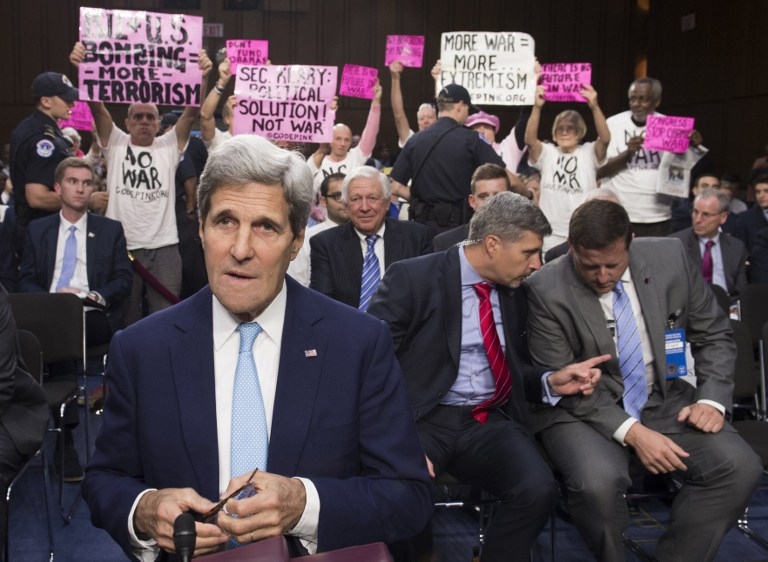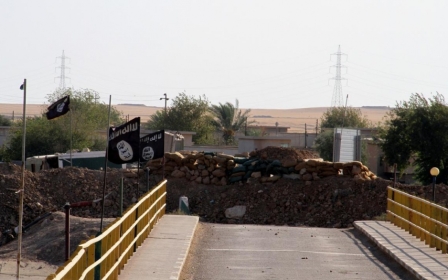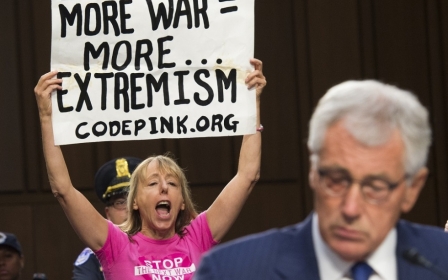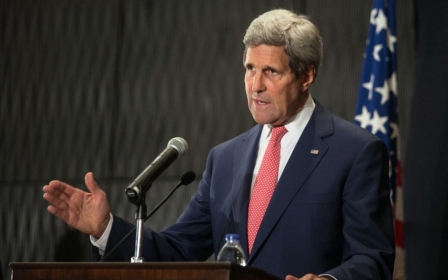US House approves plan to train Syria rebels in IS fight

US lawmakers voted Wednesday to authorise training and arming of Syrian rebels to combat Islamist militants, a key piece in the US-led coalition's strategy to battle militants in Iraq and Syria.
The vote came as analysts reported that more than 6,000 recruits have joined the militant group in Syria since US aistrikes began against the group last month.
"ISIL's widespread use of social media and growing online support intensified following the commencement of U.S. airstrikes in Iraq," FBI director James Comey told Congress on Wednesday, using an alternative acronym for the group.
Despite misgivings by war-weary Democrats that the funding of Syrian rebels could open the door to full-blown American military intervention in the Middle East, and concern by conservatives that the plan falls short of what is needed to defeat the Islamic State (IS) group, the House of Representatives voted 273 to 156 to approve Obama's train-and-equip plan.
The measure was included as an amendment to a stop-gap federal spending measure which also easily passed the House. The overall bill now shifts to the Senate, where leaders are confident it will pass Thursday and head to the president for his signature.
Obama has pressed Congress to provide him political cover to initiate military action in Syria against IS, although the White House and many lawmakers believe he has the constitutional authority to launch air strikes in Syria, as he has done in Iraq, to protect US national security interests.
While reports and rhetoric around the US-led coalition, in the drum up to increased military intervention, have focused on Islamic State militants as the major problem facing stability in the two countries, the group is a symptom of the larger issue of Sunni disenchantment, say some analysts.
IS is "effectively a re-branded version of the post-2003 Sunni insurgency, a coalition of disparate groups that came together to undermine Iraq's new democratic process and force the US out of the country," wrote Ranj Alaaldin, an Iraqi specialist and visiting scholar at Columbia University, in The Independent.
"That means that [IS] is part of a broader coalition of Sunni Arab militants and, in addition to networks of support and considerable resources, has the benefit of at least a decades’ worth of experience in effectively mobilizing the local Sunni Arab population against the Iraqi state," Alaadin added.
In other words, he wrote, only local and indigenous forces, not the US-led coalition alone, can ultimately defeat the kind of chaos for which the Islamic State has become a catch-all focus.
Some 'not convinced'
The president and his chief congressional rival, House Speaker John Boehner, both hailed the vote as an important initial step forward in taking on IS, with Obama calling on the Senate to greenlight the measure as part of his "comprehensive and sustained counter-terrorism strategy."
But many Republicans feel Obama's plan does not do nearly enough to meet the goal of destroying IS, which has overrun large areas of Iraq and Syria.
Even number two House Republican Kevin McCarthy said he was "not convinced" that it would change the balance of power on the ground, and suggested wider military action was necessary.
With Democrats split on the issue, the party's House number two, Steny Hoyer, sought to rally Congress to back the commander-in-chief in a time of crisis.
"We are united in our resolve to meet this threat. We clearly may have differences on this House floor, but we are Americans when it comes to defending our people, and our country," Hoyer told colleagues.
With the amendment attached to a temporary spending bill that expires 11 December, lawmakers are gearing up for a broader debate - after congressional midterm elections 4 November - on whether to approve a new authorisation for the use of military force to give Obama powers to prosecute a wider war against the militants in Iraq and Syria.
McKeon's amendment puts important checks on Obama's power, including a prohibition against US combat troops in Syria and requirements that the administration keep Congress in the loop with regular reporting about the operation.
Still, opponents warned of a quagmire ahead. Arming and training the Free Syrian Army, whose fighters have been accused of colluding with IS, "runs a great risk of backfiring," House Republican Tom McClintock warned, noting IS is "armed to the teeth with American equipment" and that alliances in the Middle East can change with lightning speed.
"Our consistent experience in this region should be screaming this warning at us: we're making a big mistake," he said.
Some Democrats warned that the move marked a slippery slope that would lead to US boots on the ground.
But Secretary of State John Kerry, back from a week of international coalition-building in the region, echoed Obama in insisting today's case was different.
"This is not the Gulf War in 1991. It is not the Iraq war in 2003," Kerry argued before the Senate Foreign Relations Committee, a panel he used to chair as a senator.
Current chairman Senator Robert Menendez warned Kerry that Congress may scrap the open-ended authorisation to use military force approved in 2001, under which the White House says it can conduct present-day action.
Menendez said reliance on the 2001 authorization was tied to a "thin theory that that ISIL is associated with al-Qaeda."
Middle East Eye propose une couverture et une analyse indépendantes et incomparables du Moyen-Orient, de l’Afrique du Nord et d’autres régions du monde. Pour en savoir plus sur la reprise de ce contenu et les frais qui s’appliquent, veuillez remplir ce formulaire [en anglais]. Pour en savoir plus sur MEE, cliquez ici [en anglais].




